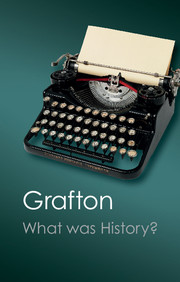3 - Method and madness in the ars historica: three case studies
Published online by Cambridge University Press: 05 December 2013
Summary
When E. H. Carr counseled his listeners to “[s]tudy the historian before you begin to study the facts,” he made clear, by a homely analogy, that the best historians were an eccentric breed, each of whom harbored a quite distinct set of interests and obsessions: “the intelligent undergraduate … when recommended to read a book by that great scholar Jones of St. Jude's, goes round to a friend at St. Jude's to ask what sort of chap Jones is, and what sort of bees he has in his bonnet. When you read a work of history, always listen out for the buzzing. If you can detect none, either you are tone deaf or your historian is a dull dog.” In this chapter, we will visit three of the artists of history. All three were strong-minded and artful writers and exceptionally original scholars. In each case, we will listen for the buzzing. But I also hope we can do something more: that we can use these three cases to see how strong individuals found very different meanings in, and advanced very different theses with, the ars historica. The genre was marked, as we have seen, by striking continuities in form and concern. Whether you were Protestant or Catholic, cleric or layman, engaged sixteenth-century jurist or dry as dust seventeenth-century polymath, if you chose to write an ars historica, you committed yourself to explaining how to learn the truth about the past, how to reduce its lessons to systematic form, and how to apply them to the present.
Information
- Type
- Chapter
- Information
- What Was History?The Art of History in Early Modern Europe, pp. 123 - 188Publisher: Cambridge University PressPrint publication year: 2012
